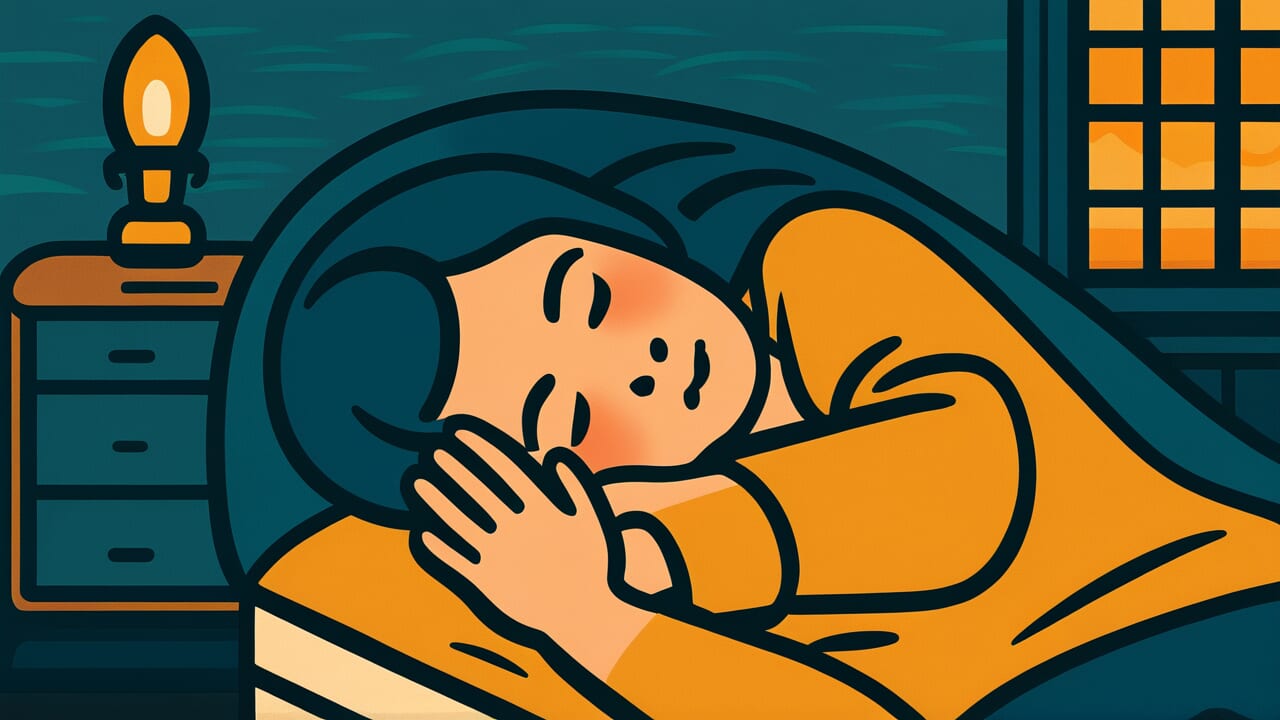How to Read “The time of sleeping is paradise”
Neru ma ga gokuraku
Meaning of “The time of sleeping is paradise”
“The time of sleeping is paradise” means that only while sleeping can you forget your real-world worries and suffering. You feel as comfortable and peaceful as if you were in paradise itself.
This proverb is used when people who carry daily struggles and worries express the joy of having their minds freed, at least during sleep.
While awake, you must face various realities. Work pressure, financial anxiety, relationship stress, and more demand your attention.
But the moment you fall asleep, your consciousness fades. You are temporarily released from all those burdens.
Even today, people in difficult situations use this phrase to express that “sleep is my only salvation.”
It also reminds us to value sleep as the only time we can escape harsh reality.
Those who know life’s hardships understand this proverb’s urgency. They also deeply appreciate the merciful relief that sleep brings.
Origin and Etymology
The exact first appearance of this proverb in literature is unclear. However, based on its structure, it likely emerged when the Buddhist term “gokuraku” (paradise) merged with common people’s everyday feelings.
“Gokuraku” originally refers to Amida Buddha’s Pure Land in Buddhism. It means an ideal world filled with comfort and free from all suffering.
During the Edo period, this Buddhist concept spread widely among common people. The word “gokuraku” became casually used in daily conversation.
This proverb’s background reflects Japanese attitudes toward work and rest. Edo period commoners started working at sunrise and continued until sunset.
In days filled with farm work and business, sleep was the only time their minds could truly be free.
While awake, they had to face various realities. Worries about making a living, troubles with relationships, and hardships at work all demanded attention.
But the moment they fell asleep, they were released from everything. They gained brief peace.
People compared this feeling to “gokuraku,” the highest state of comfort and ease. This expression was born from the earnest feelings of common people living difficult lives.
Usage Examples
- Work has been so tough lately that the time of sleeping is paradise for me
- Thinking about my debt makes me feel heavy, but the time of sleeping is paradise, which saves me
Universal Wisdom
The proverb “The time of sleeping is paradise” contains awareness of humanity’s fundamental vulnerability. It also recognizes the merciful mechanism that life possesses.
We humans suffer because we have consciousness. We agonize because we can think.
We regret the past, worry about the future, and feel pain over present difficulties. This continuous consciousness is proof of being human. Yet it is also a burden.
However, life has given us the miraculous rest mechanism of sleep. Sleep is not merely physical recovery.
It is temporary release from consciousness. It is a vacation from the self.
No matter how serious your worries are, they temporarily disappear the moment you fall asleep.
This proverb has been passed down for generations for a reason. It acknowledges that life inevitably contains suffering.
Yet it also shows hope that a way to escape that suffering is given to us daily.
Even if it’s not a complete solution but only temporary relief, it comes every day. Through this repetition, people have gained the strength to live tomorrow.
Our ancestors knew this truth. To survive life, you sometimes need time away from reality.
And they knew the most natural and reliable method is sleep, a blessing built into life itself.
When AI Hears This
The human brain is only 2% of body weight, yet it consumes 20% of the body’s total energy. This organ is a big eater.
Surprisingly, most of this energy is not used when thinking about something. It’s used when you’re spacing out.
Specifically, 60-80% of the brain’s baseline metabolism goes to the “default mode network.” This neural circuit activates when you’re doing nothing.
In other words, the sleeping brain is actually working furiously. It organizes the massive information input during the day.
It transfers important memories to long-term storage locations. It deletes unnecessary information.
This work can never be done through conscious thinking. It’s like a store that’s busy serving customers during business hours.
After closing, it does inventory management and cleaning. During the day, you’re swamped with immediate tasks.
But during the quiet nighttime hours, you can do the truly important “system maintenance.”
Even more interesting is that information recombines in the brain during sleep. New ideas are born.
This is why solutions often appear in the morning when you sleep with a difficult problem. Sleep looks like doing nothing.
But the scientific fact that it’s actually the brain’s most creative and productive time proves something important. This proverb wasn’t just a lazy person’s excuse.
It captured a deep physiological truth.
Lessons for Today
This proverb teaches modern people the value of escaping. Modern society tends to see “facing challenges without running away” as a virtue.
But sometimes consciously taking time away from reality is wisdom for surviving long-term.
Modern life especially allows 24/7 connection to problems and information through smartphones and the internet. But this also means losing time for your mind to rest.
You check social media until bedtime. You check news the moment you wake up.
With such a lifestyle, you cannot truly experience “the time of sleeping is paradise.”
This proverb teaches you the importance of securing quality sleep. It’s not just health management.
It’s a survival strategy for your mind. Remove digital devices from your bedroom.
Create one hour before bed as time when you don’t think about worries. Such small practices improve the quality of the “paradise” that visits your mind daily.
Especially in difficult times, get quality sleep. It’s not escape.
It’s recharging to live tomorrow.



Comments